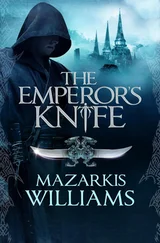T.F. Banks - The Emperor's assassin
Здесь есть возможность читать онлайн «T.F. Banks - The Emperor's assassin» весь текст электронной книги совершенно бесплатно (целиком полную версию без сокращений). В некоторых случаях можно слушать аудио, скачать через торрент в формате fb2 и присутствует краткое содержание. Жанр: Исторический детектив, на английском языке. Описание произведения, (предисловие) а так же отзывы посетителей доступны на портале библиотеки ЛибКат.
- Название:The Emperor's assassin
- Автор:
- Жанр:
- Год:неизвестен
- ISBN:нет данных
- Рейтинг книги:5 / 5. Голосов: 1
-
Избранное:Добавить в избранное
- Отзывы:
-
Ваша оценка:
- 100
- 1
- 2
- 3
- 4
- 5
The Emperor's assassin: краткое содержание, описание и аннотация
Предлагаем к чтению аннотацию, описание, краткое содержание или предисловие (зависит от того, что написал сам автор книги «The Emperor's assassin»). Если вы не нашли необходимую информацию о книге — напишите в комментариях, мы постараемся отыскать её.
The Emperor's assassin — читать онлайн бесплатно полную книгу (весь текст) целиком
Ниже представлен текст книги, разбитый по страницам. Система сохранения места последней прочитанной страницы, позволяет с удобством читать онлайн бесплатно книгу «The Emperor's assassin», без необходимости каждый раз заново искать на чём Вы остановились. Поставьте закладку, и сможете в любой момент перейти на страницу, на которой закончили чтение.
Интервал:
Закладка:
“No rest for the deevil or the ostler,” muttered the ostler, a heavy, slow shadow of a man.
“Did a big berlin come this way, traveling west?” Morton asked.
“Aye. A passel of Frenchies, wanting everything done double quick, as though they were the bloody Prince of Wales.”
All of them? Morton wanted to ask. “When did they set out from here?”
The man rubbed his head.
“Pardon me, sir,” one of the boys interjected. “Just after three. I heard the inn's clock chime.”
The ostler gave the boy a sour look.
Morton could not read his watch in the poor light but guessed sunrise was not far off. “They're just shy of two hours ahead,” he told Westcott, “which means we are not closing the gap at all. In truth, they have gained a little.” Morton considered their situation. The mail coaches did not leave London until night. He looked over at Presley. “We'll have to hire horses and try to run Boulot and his captors down. Can you manage that?”
“I'll do what needs to be done,” Presley said. He was not much of a horseman, being born to London's working class.
“We can take my carriage,” Westcott said without hesitation.
Morton turned to the navy man. “The cost of hiring post horses would be too great, Captain. My magistrate would never countenance it.”
“Then the Admiralty shall pay,” Westcott said firmly. “And if they refuse, I will bear the cost myself. And I will brook no argument on this.” Westcott turned to the ostler. “At the risk of being mistaken for the bloody Prince of Wales,” he said, “we shall need everything done triple quick. But I shall make it worth your while.”
Morton reclined as best he could in the small carriage, falling into dream only to be shaken to wakefulness by the carriage lurching or shaking. He rolled down the curtain against the morning sun, but it still found its way through the cracks, throwing stark lines of light about the carriage in a mad race.
He had sent a note back to Sir Nathaniel telling him what went on and asking that he alert the government to the possible threat to Bonaparte, but he was still not completely convinced himself. Oh, something went on, that was certain, and the man at the centre of it was the drunkard Boulot, who had once supported Bonaparte and had then become a friend of smugglers. A young woman was dead, and an old nobleman and his manservant. Lafond, a general of the Chevaliers de la Foi, was in London for the first time in years-perhaps. And Bonaparte was on a ship in Plymouth harbour. These were all threads of the same cloth, Morton was sure of that, but he could not weave them all together.
What made the most sense was that the royalists planned to murder Bonaparte. The Bonapartists had got wind of the plan from Madame De le C?ur, who almost certainly had learned of it from Angelique Desmarches, the count's mistress. The supporters of Bonaparte had then tortured Madame Desmarches to find out what the royalists were planning. They had then murdered the Count d'Auvraye in an attempt to stop the royalists.
And what of Boulot? He was the betrayer. He'd gone to the count and told him his mistress had passed information to the supporters of the Corsican. No doubt he'd offered some proof. Boulot would have known about Angelique Desmarches because he still had friends among the Bonapartists. But this betrayal hadn't swayed d'Auvraye, who refused to intercede with Fouche on Boulot's behalf, perhaps even out of anger at what Boulot had told him. The count had then cast off his mistress, thinking her in league with his enemies. It had then been easy for the Bonapartists to convince Boulot to help them assassinate d'Auvraye. The sot had provided the name of a waterman who could be involved in such a scheme or who would give them a boat but not talk to the police. But what use did the supporters of Bonaparte have for the little drunkard now?
Before he could puzzle this out any further, Morton fell into a dream. Faceless men ran from darkened doorway to alley to doorway. On a balcony overlooking the street stood the Corsican, silhouetted by a dim light from behind. The shadow men became still, and when they advanced were as stealthy as spiders. Morton could see them, but he could neither move nor cry out. A loud report, and Morton was thrown hard against the side of the carriage.
He heard Westcott talking soothingly to his team, slowing it. The carriage jounced to a halt, and Morton stepped down to the ground. It was bright morning, the summer birds in full song, swallows swooping over a field of green hay. From the driver's seat, Westcott and Presley climbed stiffly down. The navy man crouched to look under his carriage, examining each wheel, handling the spokes to be sure they were not cracked.
“Sorry to give you such a shake, Morton,” the seaman said. “Found an abyss in the road. We seem to be in one piece.”
Morton offered to drive for a time, and after Westcott had assured himself that Morton could handle four in hand, he climbed into the carriage so that he might try to sleep. The two Runners sat out in the English sun, the breeze cooling them only a little. Morton pressed the horses on, but they were tiring, and the team would have to be changed if they hoped to catch up to Boulot and his abductors.
As they crested a hill, Morton saw a large carriage disappearing beneath the elms below and set the horses to race. Presley took out a pistol and sat grimly holding on, staring at the road ahead. The carriage was soon overtaken and proved to be a very English family, their smiling faces filling the carriage windows.
Morton called to the driver: “Have you seen a large berlin, traveling west, and in a hurry?”
The man nodded. “Two hours ago. Perhaps a little more.”
Morton pressed the horses on.
CHAPTER 27
The setting sun lit all the clouds in the western sky aflame, some burning down to charcoal grey, others still molten bright-oranges and reds and liquid golds. The green rolling hills extended to every point of the compass, the shadows of trees and hedges stretched long and thin across fields and pastures. Dusk seemed to seep out of the shadows, spreading over the Somersetshire countryside, as though the darkness bled out of the earth itself.
Morton and Westcott sat up on the box, Westcott with reins and whip in hand. They had not spoken much for the past hour, watching a sky overwhelmed with transient beauty. They had stopped at a posting inn two hours earlier, where some navy men had paused en route to London. Westcott had avoided them, Morton noticed, almost to the point of hiding himself away. Morton, curious by profession, wondered why.
“You knew those officers at the inn?” the Runner said at last, having first considered several variations on the wording of his question.
“Not all of them, no,” Westcott answered softly. “Thamesly was midshipman with me briefly on the Ajax . He's a rear admiral now.”
Morton felt this was more explanation than he needed. Westcott's bitterness at having spent the war ashore was a wound Morton did not want to open. They drove on in silence, the sky burning itself out, dusk spreading over the lands. Once or twice Morton thought Westcott would speak, but then he did not.
Finally the navy man said, “You are, if I'm not mistaken, Morton, a man who takes his duty seriously. Do you ever wonder if you have not been too much of a slave to duty? If you have served her, but she has not served you in return? After all, Morton, you are also a man of considerable ability. You could have made your fortune in commerce or trade. Lesser men than you have done it. Look at Soanes-an architect now, but was his father not a bricklayer?”
Morton was about to answer that duty had no obligation to serve in return, but the question was seriously and honestly asked, and he felt it deserved an answer in kind. “I have at times felt resentment at others who have taken a path less difficult than mine, and not so narrow, and yet achieved great acclaim for their efforts. I'm sure the navy is full of men who have performed difficult service that will never be recognised. In wars, many serve but few are noticed. Some give their lives.”
Читать дальшеИнтервал:
Закладка:
Похожие книги на «The Emperor's assassin»
Представляем Вашему вниманию похожие книги на «The Emperor's assassin» списком для выбора. Мы отобрали схожую по названию и смыслу литературу в надежде предоставить читателям больше вариантов отыскать новые, интересные, ещё непрочитанные произведения.
Обсуждение, отзывы о книге «The Emperor's assassin» и просто собственные мнения читателей. Оставьте ваши комментарии, напишите, что Вы думаете о произведении, его смысле или главных героях. Укажите что конкретно понравилось, а что нет, и почему Вы так считаете.











